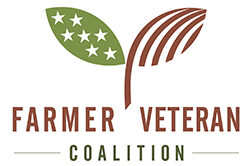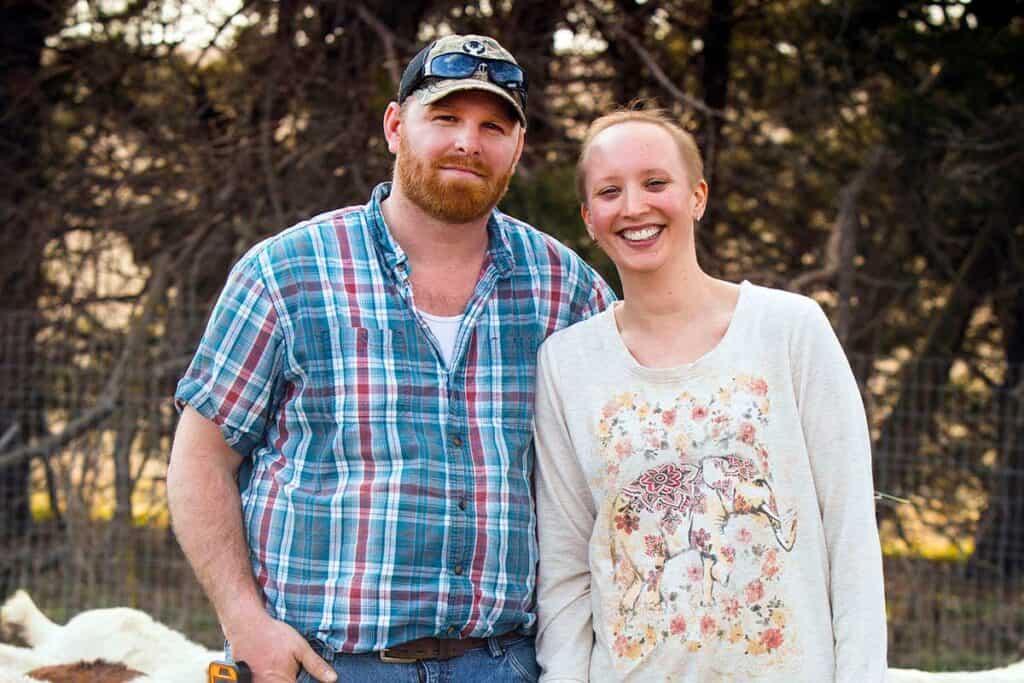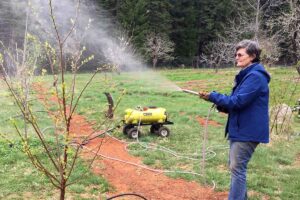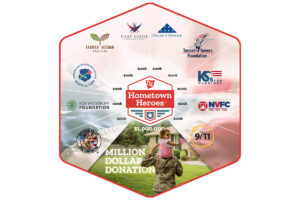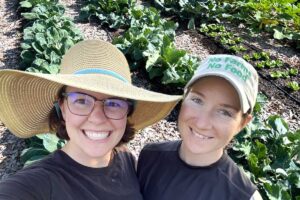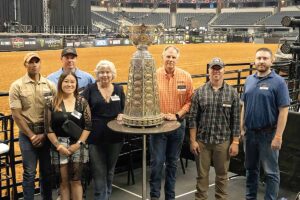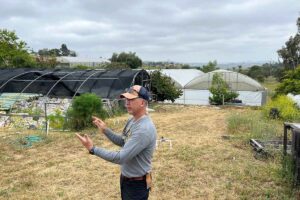Although Josh Black loves the outdoors, he considered himself a “city boy” having grown up in Omaha, Nebraska, with no agricultural experience.
Today, however, he and his wife Karly have a burgeoning goat and cattle operation in the village of Burchard, Nebraska, six miles from the Kansas border.
As they work to build up their facilities for their livestock operation, a Fellowship Fund grant helped them purchase a Sydell Corral System that is proving invaluable in caring for their goat herd, they said.
They had applied for a Fellowship Fund grant last year but were not selected. They still purchased and put up a 60-by-30-foot hoop building to get the goats out of the direct sun and inclement weather.
Karly filled out the application again this year.
“We were driving to Omaha to see family,” Josh said, “and she got this email. She turned and looked at me and said, ‘Hey, we just got approved for a grant from the Farmer Veteran Coalition.’
“I was like, ‘Are you serious? Because you worked pretty hard on that last one.’
When she confirmed this year’s grant award, Josh replied, “Oh, that’s cool.” When they learned it was for $5,000, that made it even better.
“We said, ‘Oh, we’ve been looking at this. This is another opportunity to better our facilities.”
The working system includes a tub, alley way and a tilt table.
“That way you’re not bent over working on animals all the time,” Josh said. “You could just take them and lay them on their side and it puts their feet at your level.”
Karly said that’s a huge help for Josh, who has a VA disability because of his back.
“It always is a struggle when we’re working on them and he’s bending over all the time, holding animals’ hooves to trim them and do all this,” she said. “By the next day, he’s a hurt unit.”
The new system speeds up the process and results in less stress for the animals as well as for Josh and Karly.
Beginning with Goats
Black Family Livestock began with 33 goats in 2018 and now has 125 breeding meat goats — with at any one time at least 75 goat kids — and 12 cow-calf pairs on 160 acres.
At least four times a year they vaccinate the goats, check them for worms, give medicine and/or trim hoofs.
The grant, which was funded by ADM (Archer Daniels Midland), covered about 75% of the corral system.
Josh said he’s always enjoyed the outdoors. But he didn’t get into agriculture until after his five years in the Army (2007-12) where he worked in the transportation corps, just like his grandfather. Josh had served in the 10th Mountain Division at Fort Drum in New York, then deployed in 2009 to Forward Operating Base Hammer in Iraq.
He ended his service in 2012. When he had decided not to re-enlist, Karly began looking for a full-time job elsewhere. She had recently earned her master’s degree in child, youth and family studies with a specialization in youth development.
She found work in 2011 as a youth support specialist for the Army Reserve for the 807th Medical Command Deployment Support headquartered out of Fort Douglas in Salt Lake City, Utah. Karly provided resources and referrals to soldiers and their families during their deployment cycles and attended multiple yellow ribbon events across the county each month.
Returning Home
But both said they longed to return to a smaller city and be closer to family back in Nebraska. The Omaha natives met in 2004 when both were lifeguards at a YMCA for a high school job.
They married in 2007 after Josh graduated basic training and AIT (tech training) before moving to Fort Drum.
After his service they wanted to return to Nebraska.
Josh planned to pursue a career in outfitting and began pursuing a degree in environmental science with a focus on wildlife conservation from American Military University. He connected with Scott Bodie of Big Blue Ranch, Scott’s operation consisted of rotational graze cattle and has an eco-tourism lodge with hunting packages. Scott and Josh connected over their love of the outdoors and military background.
“I did ask him if I could come back out at some point and maybe go hunting or something and just kind of come and hang out and if I had more questions later, pick his brain some more on outfitting and whatnot,” Josh said.
He was still going to college at the time, but in the spring of 2014 Scott called to ask for Josh’s help to calve out 565 bred cows he had purchased.
“(Scott) said, ‘If you want some experience, I’ll give you 10 years of experience in one year,’” Josh recalled.
After talking with Karly, he decided to give it a shot.
Onto the Ranch
Karly and Josh said the support and mentorship they received from Scott Bodie and his wife, Billie Kay, was incredible.
“We moved out to live on the ranch property in 2017,” Karly recalled. “With their encouragement and support we purchased our first goats in 2018. Scott and Billie Kay sold us the ranch house (that they had lived in) and 160 acres in 2021. Our Boer goat herd continued to grow and we purchased our 12 cows we calved out in 2022.”
That first herd of 33 goats, though, proved to be a steep learning curve, Josh said.
“I went into goats thinking, oh, they’re ruminants. We can treat them just like cattle.
They’re very similar in their anatomy,” he said. “You cannot raise goats like you can raise cattle. They’re much more susceptible to things than cattle are.”
Their herd was hit with an outbreak of barber pole worms, which Josh described as “the Achille’s heel” for goats as well as battling pneumonia.
It had Josh thinking about throwing in the towel, he admitted.
“But we were too deep into it to do that,” he said. “So we kept going and now we’re upwards of 200 goats that we’re raising and our goal … I’d like to have 500, 700 head of goats. We’re going to fill up the pasture that we have.”
Paying It Forward
Raising goats is a niche market in beef-heavy Nebraska, Josh said, so he’s become a bit of an expert. The farm was part of an Eastern Nebraska ag tour on goats.
“We open up our facilities, share kind of our management practices, our lessons learned, and answer some of their questions,” he said. “I’d say we try to pay it forward. We have a great mentoring relationship with Scott (Bodie). We couldn’t have gotten this done without help from others.”
Josh also mentors a neighbor who decided to have a goat herd.
When they moved back to Nebraska, Karly accepted a position as a 4-H youth development extension educator in Pawnee Country with Nebraska Extension. Since 2020, she is still with Nebraska Extension, but works as an engagement zone coordinator, supervising seven county offices and focusing on maintaining strong stakeholder relationships within those counties.
She helps Josh as she can with their herd. Both expect their 3-year-old, Theodore, to be working alongside them in the future.
“What I really like about being in the livestock business is every day’s different,” Josh said. “And you get to see some finished product at the end. We have a goal where we take our animals from birth to a certain size and then we sell that crop. That’s the end product.
“So when it’s successful and we get there, that makes you feel pretty good.”
Follow their journey at https://www.facebook.com/BlackFamilyLivestock
